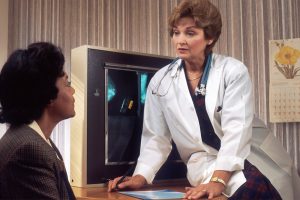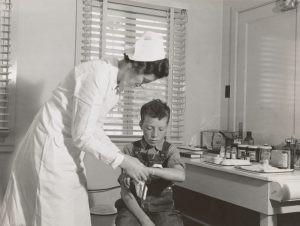Nurse Practitioners Schooling and Education Requirements
 Nurse Practitioners (NPs) are advanced practice registered nurses who provide comprehensive care to patients. Not only do nurse practitioners provide diagnostic care and treatment, but they also focus on preventive health maintenance. Nurse practitioners are first and foremost nurses, which means patient education and holistic care is a large part of their practice. Depending on the state in which they practice, oversight by physicians may or may not be required.
Nurse Practitioners (NPs) are advanced practice registered nurses who provide comprehensive care to patients. Not only do nurse practitioners provide diagnostic care and treatment, but they also focus on preventive health maintenance. Nurse practitioners are first and foremost nurses, which means patient education and holistic care is a large part of their practice. Depending on the state in which they practice, oversight by physicians may or may not be required.
Why Are Nurse Practitioners So Important?
Nurse practitioners can diagnose and treat patients as well as perform procedures. They differ from physicians in that their patient care approach is more holistic. Being nurses, they gather information about a patient not only to include physical symptoms but psychosocial and environmental information as well. They are skilled in education and therefore can spend time teaching patients and family about disease processes, treatments, and healthcare prevention as well as diagnosing acute health issues.
According to the American Association of Nurse Practitioners, nurse practitioners can also help lower the cost of healthcare, as patients who use NPs as their primary care provider have fewer emergency room visits and shorter hospital stays. Additionally, they help to fill the gap with the primary care physician shortage in the United States. They also tend to have high patient satisfaction.
How to Become a Nurse Practitioner
Nurse practitioners are advanced practice registered nurses who have completed a Master’s of Science in Nursing (MSN) or a Doctor of Nursing Practice program (DNP).
To advance to a master’s degree or doctoral in nursing, a student must complete an accredited nursing program and obtain a Bachelor’s of Science in Nursing (BSN). Upon graduating with a nursing degree, successful completion of the NCLEX-RN is needed for licensure. The length of time it takes to obtain an MSN depends on the nurse’s starting point:
- Nursing students enrolled in a BSN program complete in about four years
- RN to BSN takes about two years
- BSN to MSN takes about two years
- BSN to DNP takes three to four years
- MSN to DNP takes one to two years
Additionally, both online programs and classroom programs are available to accommodate students. Both types have pros and cons depending on students’ needs, therefore researching individual schools is encouraged.
Nurses who enjoy practicing independently and who wish to diagnose and prescribe while still utilizing nursing skills can advance to the field of advanced practice nursing. Nurses who seek to pursue their NP should value autonomy, integrity, and leadership.
Educational Prerequisites
Some graduate programs require nurses to gain a few years of clinical experience before enrollment. Some schools allow nurses to work concurrently during the program. Regardless, obtaining clinical experience is crucial as it prepares the future nurse practitioner to be able to address a multitude of medical concerns and situations.
Nurses are also required to have a baccalaureate nursing degree (BSN). Nurses who hold an Associate’s Degree in Nursing (ADN) will need to obtain a BSN. There are many opportunities to obtain a BSN. Many healthcare organizations also assist employees in advancing degrees and assist in tuition reimbursement, cost of books, and granting time off for nurses.
Nurse Practitioner Program Specialties
There are many clinical areas in which a nurse practitioner can work. From primary care to specialty care, acute care, and long-term care, nurse practitioners are valuable members of the patient care team. Some NP programs include training in certain specialties; otherwise, certification can be obtained through the American Nurses Credentialing Center (ANCC). Some areas include:
Nurse Practitioner Careers and Outlook
Nurse practitioners are valuable members of the healthcare team. As providers, teachers, leaders, and patient advocates, nurse practitioners approach patient care in a holistic manner to ensure patient needs are met at the time of visit.
Nurse Practitioner Responsibilities & Duties
NPs have many responsibilities and duties. These may include:
- Provide acute (i.e. illness) and preventive care (check-ups)
- Take a patient history
- Maintain their own patient panel
- Order diagnostic testing/therapies
- Order prescriptions
- Assist in surgery
- Admit, transfer and discharge hospitalized patients
- Collaborate with specialty departments as needed, refer patients appropriately
- Assess patient/family needs
- Provide education to patients/families
- Promote family-centered patient care

 A clinical nurse specialist (CNS) is a graduate-level registered nurse who is certified in a specialty of choice. Obtaining specialty certification demonstrates an advanced level of knowledge as well as advanced clinical skills in a niche area of nursing.
A clinical nurse specialist (CNS) is a graduate-level registered nurse who is certified in a specialty of choice. Obtaining specialty certification demonstrates an advanced level of knowledge as well as advanced clinical skills in a niche area of nursing. A relatively new specialty, the clinical nurse leader (CNL) is a master’s level educated nurse who is focused on improving the quality of care for a specific set of patients. Working together with a multi-disciplinary team of physicians, pharmacists, social workers, clinical nurse specialists and nurse practitioners, the clinical nurse leader collects and evaluates treatment results and works to improve those outcomes by advocating for evidence-based change. Unlike the
A relatively new specialty, the clinical nurse leader (CNL) is a master’s level educated nurse who is focused on improving the quality of care for a specific set of patients. Working together with a multi-disciplinary team of physicians, pharmacists, social workers, clinical nurse specialists and nurse practitioners, the clinical nurse leader collects and evaluates treatment results and works to improve those outcomes by advocating for evidence-based change. Unlike the  A certified nurse midwife, sometimes referred to as a CNM or simply a nurse midwife, is an advanced-practice registered nurse (post-baccalaureate) who specializes in women’s reproductive health and childbirth. Not only do they attend to women during pregnancy, childbirth, and post-partum, they also are responsible for preventive women’s health maintenance.
A certified nurse midwife, sometimes referred to as a CNM or simply a nurse midwife, is an advanced-practice registered nurse (post-baccalaureate) who specializes in women’s reproductive health and childbirth. Not only do they attend to women during pregnancy, childbirth, and post-partum, they also are responsible for preventive women’s health maintenance. Simply put, an APRN is an Advanced Practice Registered Nurse. This means that this type of RN has earned a graduate-level degree such as a
Simply put, an APRN is an Advanced Practice Registered Nurse. This means that this type of RN has earned a graduate-level degree such as a  The wound care, ostomy, or continence and foot care nurse (also referred to as a WOC nurse) specializes in assessing and treating skin breakdown and wounds, especially pressure ulcers. They often cross-train in the care of
The wound care, ostomy, or continence and foot care nurse (also referred to as a WOC nurse) specializes in assessing and treating skin breakdown and wounds, especially pressure ulcers. They often cross-train in the care of  Housing is one of the most significant concerns for a travel nurse. There are a few options available, and it depends on the travel nurse agency/company regarding how accommodations are set up. Some companies provide housing (i.e., apartment, duplex, etc.). Some companies offer a housing stipend, or a fixed amount of money each month to apply towards housing.
Housing is one of the most significant concerns for a travel nurse. There are a few options available, and it depends on the travel nurse agency/company regarding how accommodations are set up. Some companies provide housing (i.e., apartment, duplex, etc.). Some companies offer a housing stipend, or a fixed amount of money each month to apply towards housing. Travel nurses are RNs from various clinical backgrounds who work for independent staffing agencies. They are assigned to different care areas on a temporary basis to fill in short-term employment gaps.
Travel nurses are RNs from various clinical backgrounds who work for independent staffing agencies. They are assigned to different care areas on a temporary basis to fill in short-term employment gaps. A trauma nurse is a nurse who specializes in the care of patients who suffer an acute injury or illness, whether it is accidental or intentional. Trauma nurses are skilled in caring for patients of all ages—from newborn to the elderly. Examples of cases that trauma nurses may be involved in are:
A trauma nurse is a nurse who specializes in the care of patients who suffer an acute injury or illness, whether it is accidental or intentional. Trauma nurses are skilled in caring for patients of all ages—from newborn to the elderly. Examples of cases that trauma nurses may be involved in are: A transplant nurse cares for patients who are receiving or donating organs via a transplant surgical procedure. They prepare living donors who volunteer to donate organs and tissues for transplant and educate them on the procedure, recovery and risks. Transplant nurses also care for patients who receive organs by preparing patients for surgery, assisting during the procedure and providing post-operative care, including monitoring for complications like organ rejection.
A transplant nurse cares for patients who are receiving or donating organs via a transplant surgical procedure. They prepare living donors who volunteer to donate organs and tissues for transplant and educate them on the procedure, recovery and risks. Transplant nurses also care for patients who receive organs by preparing patients for surgery, assisting during the procedure and providing post-operative care, including monitoring for complications like organ rejection.